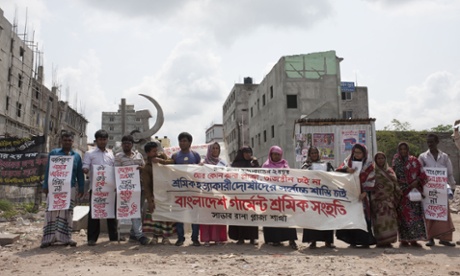
Workers in factories in Bangladesh making clothes for western firms continue to suffer from poor working conditions two years after a factory collapse that killed 1,100 people and prompted widespread promises of reforms, a new report by campaigners claims.
The report from Human Rights Watch, the independent advocacy organisation, comes on the second anniversary of the collapse of the Rana Plaza factory on the outskirts of Dhaka, the capital of Bangladesh.
More than 1,100 garment workers working on orders for high-street retailers in the west died in the tragedy, which briefly focused global attention on the problems created by the booming global clothing industry.
Following the disaster, retailers and Bangladesh’s government promised widespread reforms. Thousands of factories have since been checked for structural problems with dozens closed and others refurbished, and many more helped to improve working conditions and treatment of employees in initiatives partly paid for by western retailers. However, the report suggests problems remain.
Researchers interviewed more than 160 workers from 44 factories in and around Dhaka, including many that supply garments to high streets in North America, Europe and Australia. They heard complaints of physical assault, verbal abuse, forced overtime, unsanitary conditions, denial of paid maternity leave, and failure to pay wages and bonuses on time or in full.
Western companies often insist on high standards in contracts with Bangladesh-based producers but are not always successful in monitoring the situation on the ground, observers say. One persistent problem has been the sub-contracting of orders by local manufacturers.
Human Rights Watch said it had contacted all those western manufacturers that use factories where the group believes there are problems. Two denied any link, eight said they were investigating the claims and 13 had not replied.
The clothing industry in Bangladesh is second only to China’s in size and employs about four million people, mainly women, in approximately 3,500 factories. Ready-made garments account for nearly four-fifths of the country’s exports and contributes more than 10% of GDP of the developing south Asian nation.
Following the Rana Plaza tragedy, retailers set up two consortia: the Accord on Fire and Building Safety, including 180 firms most of which are based in Europe, and the Alliance for Bangladesh Worker Safety, a group of 26 North American retailers – to help local employers fund structural improvements and an inspection regime. The two organisations cover more than 2,000 factories. The Bangladeshi government’s own inspectors, supported by the International Labour Organisation and funded by the EU, are inspecting and overseeing improvements in another 1,500.
The government also made legal changes that have helped increase the number of unions. There are now more than 400 – three times more than in 2012. However, the report says, many workers who try to form unions to address such abuses face threats, intimidation, dismissal, and sometimes physical assault by factory managers or hired thugs.
Phil Robertson, Asia deputy director at Human Rights Watch, said: “If Bangladesh wants to avoid another Rana Plaza disaster, it needs to effectively enforce its labour law and ensure that garment workers enjoy the right to voice their concerns about safety and working conditions without fear of retaliation or dismissal.”
Earlier this week organisers of a compensation fund set up by retailers and labour groups for victims of the Rana Plaza tragedy said only $24m (£15.9m) of the $30min compensation estimated as necessary had been paid or pledged to the families of those killed.
Sultan Uddin Ahmed, a member of a committee that runs the trust fund, criticised retailers for not doing enough for dependants along with 1,500 workers who suffered horrific injuries in the disaster. “It is unfortunate, we could not clear all the dues in two years ... Bangladeshi factory-owners are also to blame. They did not pay anything to the fund,” Ahmed said.
Last week, the Italian fashion retailer Benetton announced it would pay $1.1m into the trust fund. Benetton, which initially denied using any firms located in Rana Plaza, said it was donating double the amount advised by experts.
Campaigners claim about a dozen clothing companies linked to the Rana Plaza factories have yet to pay any compensation money.
However, the Human Rights Watch report acknowledges the role played by the garments industry in the economic development of Bangladesh. “Continuing the economic success of the Bangladesh garment sector offers benefits for everyone – the retail companies and their consumers, factory owners, and the government ... But those gains should not come at the cost of lives and the suffering of garment workers struggling for a better future,” it said.

